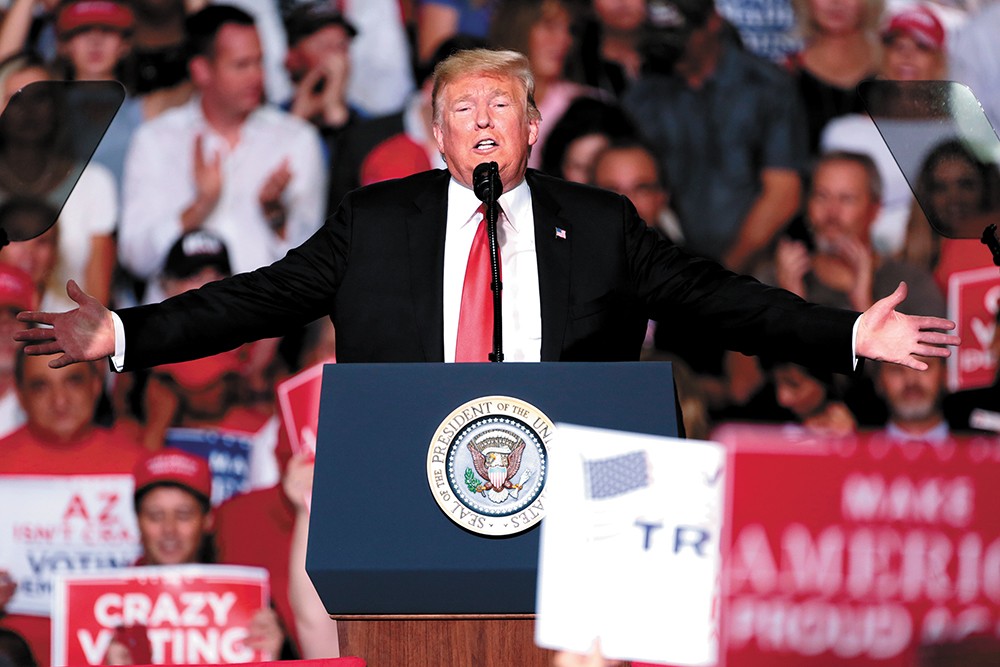
Take away the campaign rhetoric claiming the tax bill will either save or lead to the demise of America. Take away the headlines and the talking heads debating on TV. When it comes down to it, most people want to know one thing: Is the Tax Cuts and Jobs Act of 2017 good for my wallet?
The simple answer is yes, probably. Odds are, you saved money when you filed your taxes this year. But in a broader will-it-lift-up-the-economy-and-everyone-in-it sort of way, the outlook is a bit muddier.
Let's start with the money in your pocket. Anson Avery, a Spokane accountant and CPA with more than 50 years of experience doing taxes, made it his goal to find out how the bill would impact taxpayers from a variety of incomes and situations. His accounting firm spent hundreds of hours analyzing 30 different samples with annual incomes ranging anywhere from $10,000 to $3.2 million, compiling the data in a book he's called Tax Tsunami: The Truth About Tax Reform.
Of the 30 samples, all but one came away with lower taxes. The one with no tax cuts was a sample of a person who is single with no dependents with an Adjusted Gross Income of $10,000. When looking at who saw the largest percent decrease in taxes, it looks like a bell curve: the poorest and the richest saw more modest reductions in taxes by percentage, and the middle class saw the highest.
"Overall, this is a tremendous tax break for the middle class," Avery says.
Keep in mind, that doesn't mean the poor and the middle class will be saving more money than the rich. A married couple filing jointly with two dependents with an adjusted gross income of $40,000 might see a 170 percent reduction in taxes in 2018, but that's still just $1,510 in savings. A couple making $800,000 a year, meanwhile, would see a 12 percent reduction that saves $30,503, according to Avery's analysis.
The Brookings Institution, a think tank based in Washington, D.C., offered an analysis last June supporting the assertion that most people will get a tax cut. Four out of five people will receive a tax cut averaging about $2,100 in 2018, they say. The analysis paints a broader picture broken down by who exactly will see tax cuts: Just over half of the lowest income households will see lower taxes, but more than 90 percent in the middle and top earners will receive tax cuts.
The bill also gives a deduction for pass-through income, or business income you can report on your personal tax return. Avery calls that a "home run for businesses."
So that's basically how the tax cuts will affect people directly. But there will be other impacts to your wallet that are indirect. And that's where things get trickier.
As has been well-documented, the tax bill lowers the corporate income tax rate to 21 percent. John Beck, a professor of economics at Gonzaga University, says theoretically that should attract more investment to the U.S. But whether it will benefit just the wealthy or everyone else too remains to be seen. Corporations gave bonuses to workers following the tax cuts, but those were mostly for PR purposes; Beck is interested in following whether it actually translates to workers.
"It's not a real clear-cut answer to that," Beck says. "You can't just answer that theoretically, and empirical evidence is not real conclusive."
Notably, the bill puts a cap on the state and local tax deduction, which affects high tax states (and as some have noted, tends to punish Democratic states). The bill will lower the amount of people claiming that deduction, however, and Beck says there won't be too many people in Eastern Washington using it.
And you can't ignore that the tax bill will increase the federal budget deficit. That can lead to a widening trade deficit. Essentially, paying for the tax cuts will mean the government will need to borrow money from foreign investors, who will get that money from selling goods and services to the U.S.
"To the extent that Washington is involved in international trade," Beck says. "That would have an impact on our state."
For Beck, the tax bill isn't really tax reform. For real tax reform, Beck says he would have gone further by closing certain loopholes.
"For the most part, it wasn't really tax reform," Beck says. "It was a tax cut." ♦























